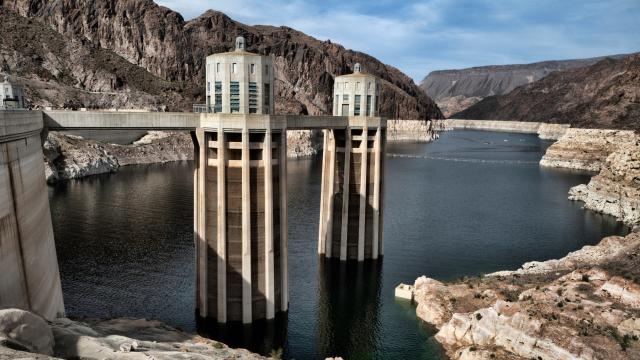Human fingerprints are all over the world’s freshwater. A new study published Wednesday in the journal Nature shows that while human-controlled freshwater sources make up a minimal portion of the world’s ponds, lakes, and rivers, they are responsible more than half of all changes to the Earth’s water system.
The study used new satellite laser technology to take a closer look at freshwater sources across the world and monitor their water levels through different seasons. Using NASA’s ICESat-2 satellite, researchers monitored more than 227,000 bodies of freshwater–ranging in size from the Great Lakes to tiny ponds over period spanning roughly a year and a half. Researchers found that 57% of global seasonal water storage variability occurs in human-controlled reservoirs.
“This large proportion is even more striking when one considers that reservoirs only account for 3.9% of the 227,386 lakes analysed in this study,” Sarah Cooley, the study’s lead author who is currently at the University of California, Berkeley but started the work while at Brown, said over email. “While the water cycle is generally portrayed as a natural process, our finding that humans are responsible for the majority of seasonal surface water storage variability shows that we are now a key regulator of the water cycle.”
[referenced id=”1656097″ url=”https://gizmodo.com.au/2020/12/wall-streets-new-water-market-is-the-latest-sign-were-headed-toward-a-mad-max-future/” thumb=”https://gizmodo.com.au/wp-content/uploads/2020/12/08/pkgmwvikx3fffqb1m9mu-300×169.jpg” title=”Wall Street’s New Water Market Is the Latest Sign We’re Headed Toward a Mad Max Future” excerpt=”We need water to cook and wash our bodies and clothes, and especially to drink — without it, we can’t live. Despite this, Wall Street traders are going to start betting on it as a commodity.”]
Before the launch of this satellite in 2018, which was originally designed to observe ice sheets and can collect extraordinarily detailed data, it was actually difficult to get a grip on how freshwater bodies shifted over time. Cooley said that most human-controlled reservoirs have gauges to measure water levels, but there’s no global database for these measurements. Few non-reservoir lakes and ponds, meanwhile, have gauges.
Satellites before ICESat-2 could only monitor a couple hundred of the world’s biggest lakes, so the data collected here is pretty exciting for folks who spend their time thinking about freshwater cycles. “This study provides the first global quantification of variability in surface water level and human influence on surface water storage,” Cooley said.
Now that we can see how water cycles around the world behave — and how much impacts humans have on freshwater reserves — it can tell us a lot about the future and how to improve management. That’s especially vital as the climate crisis further alters the water cycle.
“Humans exerting a strong control on surface water variability is not inherently a bad thing,” Cooley said, explaining that a human hand in managing freshwater is essential in sustaining our life on Earth, including powering hydroelectric dams, irrigating farms, and, you know, giving us water to drink. But “amplifying seasonal variability in water storage can certainly have detrimental impacts on the environment through increasing evapotranspiration and greenhouse gas emissions, degrading water quality, negatively impacting ecosystems and enhancing downstream erosion.”
Climate change already looms large over the world’s freshwater supply. Major sources of drinking water, like the Colorado River, have less water and are flowing more slowly due to climate change — even as they face increasing demand from our water-hungry farms and cities. Rainfall itself is becoming more erratic in some locations, such as California, leading to years with too much water for infrastructure to handle and others where reservoirs run close to dry. In December, Wall Street began betting on water as a commodity, as money vultures see water scarcity as a new opportunity to profit in decades to come. With these changes — and the risk of profiteering off a natural resource vital for life — monitoring what is really going on with the water supply is going to be even more important.
“For ensuring the sustainability of freshwater resources worldwide, it is valuable, though, to understand where humans are exerting the most control on surface water storage, as these may be areas which are more vulnerable in the future,” Cooley said.
